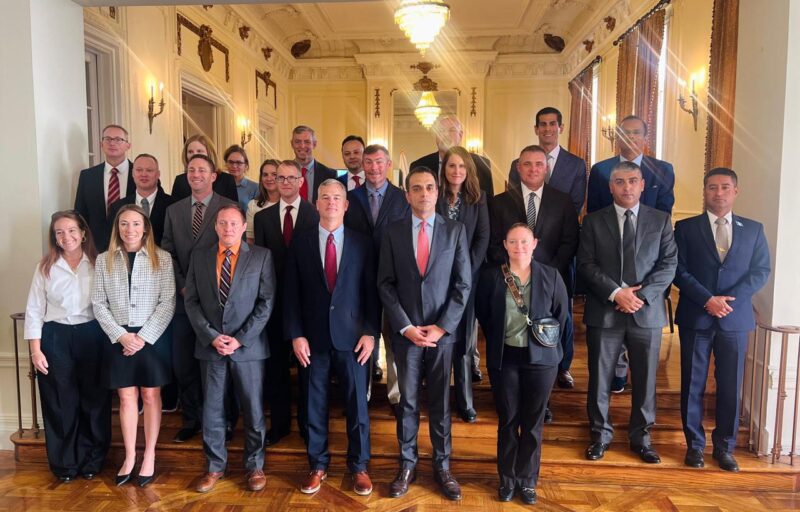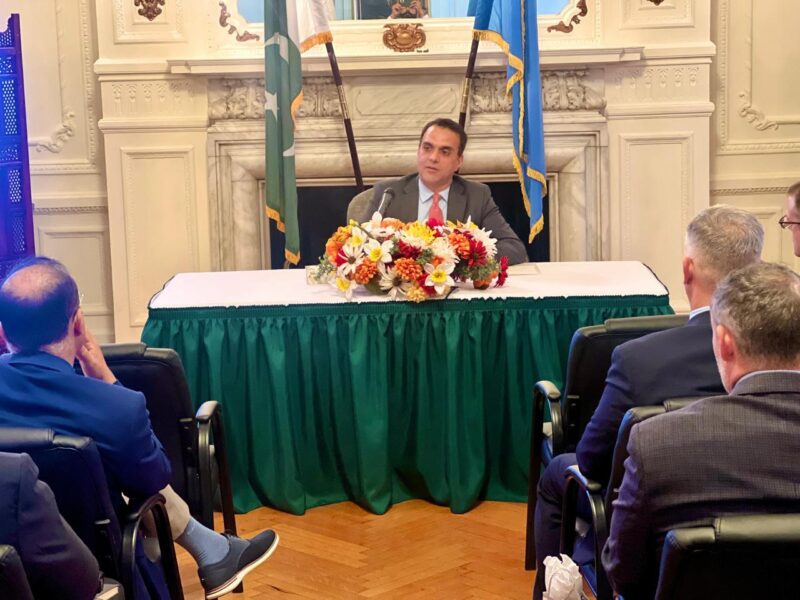NEW YORK: A 23-member delegation of the US Army War College visited the Pakistan Mission in New York and received a briefing from Ambassador Usman Jadoon, acting permanent representative of Pakistan to the United Nations.
Ambassador Jadoon threw light on the full spectrum of Pakistan’s work with the United Nations, including its stance on various regional and international issues.
He said that ever since becoming a UN member in 1947, Pakistan has worked actively to promote the purposes and principles of the UN Charter. He said that Pakistan served on different key positions of the United Nations including membership of the UN Security Council and contributed to advancing peace and security, sustainable development and human rights in line with the UN Charter.
Ambassador Jadoon also highlighted Pakistan’s role in projecting the Kashmir cause at the UN and explained the dispute from the perspectives of international law, human rights and peace and security in South Asia.
 He said that the right to self-determination is one of the fundamental pillars of the UN Charter and without granting this right to peoples under foreign occupation like those in Jammu and Kashmir and Palestine, the prospect of durable peace and stability will remain elusive.
He said that the right to self-determination is one of the fundamental pillars of the UN Charter and without granting this right to peoples under foreign occupation like those in Jammu and Kashmir and Palestine, the prospect of durable peace and stability will remain elusive.
He said that the UN Security Council resolutions provide the framework for the resolution of the Kashmir dispute.
Pakistan’s acting UN envoy also briefed the US Army delegation about Pakistan’s role and sacrifices in the war on terrorism. Explaining Pakistan’s recent terrorism challenge, he said that Afghanistan is becoming a hub of terrorism where the TTP has used the Afghan soil to consistently target Pakistan.
He said there were valid concerns about the TTP forming an alliance with other terrorist organizations, principally Al-Qaeda with implications for regional peace and security. He said that Pakistan shared the expectations of the international community about political inclusivity, and provision of educational and employment opportunities to women in Afghanistan but added in the same breath that equal attention needed to be paid to the counter-terrorism aspect as well.
Ambassador Usman Jadoon said that developing countries can achieve sustainable development goals and deal with the climate hazards if they are enabled to access global concessional finance. He said that mounting debt liabilities, and increase in fuel and commodity prices had created formidable challenges for the economies of developing countries.
He said that Pakistan is advocating the reform of international financial architecture in a manner that it is equitable and fair and helps the Global South overcome development deficits.
Ambassador Jadoon also explained Pakistan’s position on reform of the UN Security Council and stated that Pakistan wanted the UNSC to become more representative, democratic and efficient. He said that Pakistan as part of Uniting for Consensus (UfC) group was against the idea of increasing the Security Council membership in the permanent category, stating that such a measure would increase the paralysis of the Council.
He said that Pakistan was supportive of the proposal to increase non-permanent members by election including regional and cross-regional representation, which would make the Council truly representative of the UN membership.
The talk was followed by question and answer session where the visiting delegates asked questions about the Jammu and Kashmir dispute; India-Pakistan bilateral relations; Ukraine and Gaza wars; climate threat; counter-terrorism, and Pakistan’s priorities as a non-permanent member of the UN Security Council, etc.


Comments are closed.